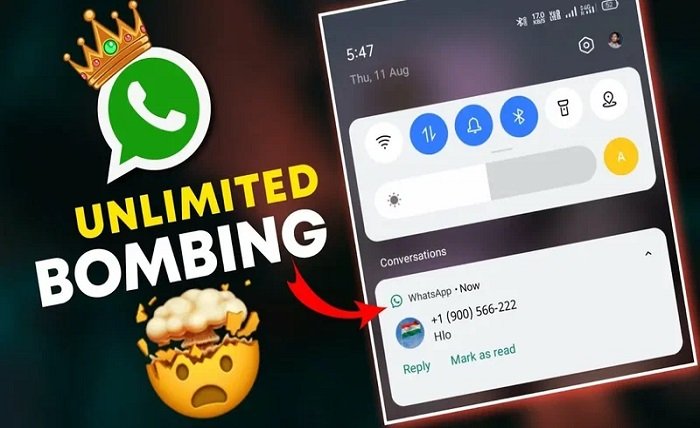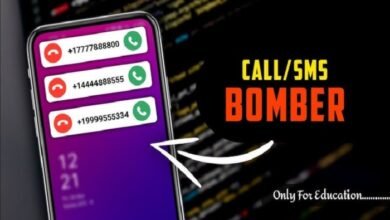Call Message Bomber: Understanding the Concept and Its Implications

The term “call message bomber” refers to a tool or software that floods a target’s device with a high volume of calls or messages in a short time. While it can be used for benign purposes like testing or stress-testing systems, it often carries negative connotations due to its misuse in cyber harassment or spamming. Understanding what a call message bomber is and its implications is crucial in today’s tech-savvy world.
What is a Call Message Bomber?
A call message bomber is typically a program or application designed to send an overwhelming number of calls or text messages to a phone number or communication system. The term “call message bomber” reflects its disruptive nature, as the onslaught of communication attempts can render the recipient’s device almost unusable.
Call message bombers have legitimate applications in areas like system testing. However, when used maliciously, they can lead to annoyance, disruption, or even psychological distress for the target.
Legitimate Uses of a Call Message Bomber
Although the term “call message bomber” often carries a negative connotation, there are legitimate uses for such tools.
- System Stress Testing: Developers may use a call message bomber to simulate high-traffic scenarios to test the resilience and capacity of communication systems.
- Alerts and Notifications: In some cases, organizations might use similar mechanisms to send mass notifications or alerts during emergencies.
- Awareness Campaigns: Some marketers may leverage call message bombers to disseminate promotional material, although this is less common due to ethical concerns.
Despite these valid uses, the potential for abuse often overshadows the legitimate applications of a call message bomber.
Risks and Misuses of a Call Message Bomber
The misuse of a call message bomber can have significant consequences for both individuals and organizations. Misuse often involves sending unsolicited calls or messages to annoy, harass, or harm the recipient.
Some common risks and abuses include:
- Harassment: Cyberbullies may use a call message bomber to target individuals, flooding their devices with disruptive communications.
- Denial of Service (DoS) Attacks: Attackers can target businesses or individuals, rendering their communication lines unusable.
- Fraudulent Activities: Scammers may use a call message bomber to obscure their activities by overwhelming victims with communication attempts.
- Privacy Violations: Unauthorized use of a call message bomber can expose sensitive information or lead to identity theft.
Understanding these risks is essential to prevent falling victim to or inadvertently participating in unethical practices.
Ethical and Legal Implications of Call Message Bombers
The ethical concerns surrounding call message bombers cannot be overstated. Misusing a call message bomber to disrupt someone’s life or operations is a violation of personal boundaries and privacy.
Legally, unauthorized use of a call message bomber can result in severe consequences, including fines and imprisonment. In many jurisdictions, cyber harassment and spamming are prosecutable offenses. For example:
- Data Protection Laws: Using a call message bomber without consent violates data protection regulations like GDPR or CCPA.
- Cybercrime Laws: Many countries classify disruptive cyber activities as criminal offenses under their cybercrime legislation.
When considering the use of a call message bomber, it’s essential to evaluate its ethical and legal ramifications.
Protecting Yourself from Call Message Bombers
If you find yourself on the receiving end of a call message bomber attack, there are steps you can take to minimize the disruption and protect your privacy:
- Block Unknown Numbers: Use call-blocking features on your device to prevent repeated nuisance calls or messages.
- Report Abuse: Notify your telecom provider or relevant authorities about the attack.
- Use Anti-Spam Apps: Install applications designed to filter and block spam communications.
- Enable Do Not Disturb Mode: Temporarily silence all calls and messages to regain control of your device.
- Seek Legal Help: If the attack persists, consult legal experts to take appropriate action.
Being proactive can help mitigate the effects of a call message bomber attack and safeguard your communication channels.
Alternatives to Call Message Bombers for Communication
While a call message bomber might seem like a quick solution for mass communication, there are more ethical and effective alternatives:
- Email Campaigns: Use email marketing platforms to reach a large audience without violating their privacy.
- Group Messaging Services: Tools like WhatsApp Business or Slack allow for organized and non-intrusive communication.
- Push Notifications: For businesses, push notifications are a subtle yet effective way to engage with users.
- Traditional Broadcasting: SMS and IVR systems can be used responsibly to deliver important messages.
These alternatives ensure that you achieve your communication goals without resorting to disruptive practices.
Conclusion
A call message bomber is a powerful tool with both legitimate and malicious applications. While it can be useful in system testing or emergency alerts, its misuse poses significant risks to individuals and organizations. By understanding its implications, legal boundaries, and ethical concerns, we can better navigate the challenges associated with such technology.
Whether you’re a developer, marketer, or an average smartphone user, staying informed about call message bombers can help you make responsible choices and protect yourself from potential threats.
FAQs
1. What is a call message bomber?
A call message bomber is a tool or software designed to send an overwhelming number of calls or messages to a target device.
2. Are call message bombers legal?
The legality of call message bombers depends on their use. Misusing them for harassment or spamming is illegal in most jurisdictions.
3. How can I protect myself from a call message bomber?
You can protect yourself by blocking unknown numbers, reporting abuse to your telecom provider, and using anti-spam apps.
4. What are the legitimate uses of a call message bomber?
Legitimate uses include system stress testing, emergency alerts, and mass notifications for specific audiences.
5. What are some ethical alternatives to call message bombers?
Ethical alternatives include email campaigns, group messaging services, push notifications, and traditional broadcasting methods.





